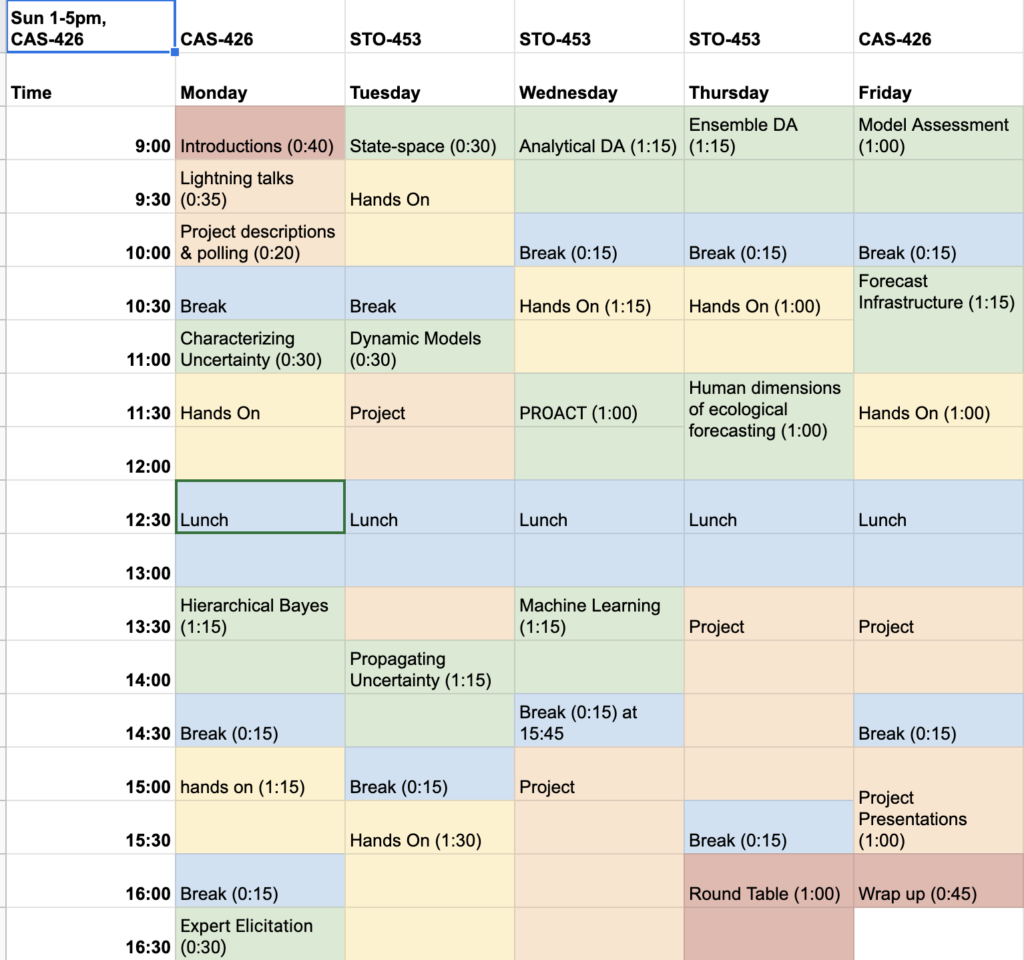June 27-July 1, 2022
Boston University
As part of the NSF-funded Near-term Ecological Forecasting Initiative, this course targets graduate students, post-docs, and early-career scientists interested in learning about ecological forecasting in a variety of contexts. In addition to academics, we reserve slots specifically for agency and NGO scientists. This course is adapted from the recently published Ecological Forecasting book by Dr. Michael Dietze and will highlight iterative forecasting approaches.
Topics include Bayesian statistics (simple models, hierarchical Bayes, state-space models, etc); fusing multiple data sources; forecast uncertainty propagation & assessment; iterative data assimilation (e.g. Kalman Filter, Ensemble Kalman Filter, Particle Filter); machine learning; decision science; and a range of ecological forecasting applications such as phenology, microbiomes, carbon, infectious disease, and aquatic productivity. The course provides a mix of lectures and hands-on applications, including a final end-of-week group project. More detail about course content and schedule will be posted soon, but for now please refer to the 2020 and 2019 course pages.
Instructors include Michael Dietze (Boston University), Shannon LaDeau (Cary Institute of Ecosystem Studies), and Jennifer Bhatnagar (BU). Guest instructors include Jake Zwart (USGS) and Kira Sullivan-Wiley (Pew Charitable Trust).
Course Materials
Schedule

Lecture slides
Characterizing uncertainty & Hierarchical Bayes
Human Dimensions of Ecological Forecasting
Applications
Applications were due August 15th, 2021
Application materials include:
- Application form <requires Google Drive login because files are uploaded>
- CV
- Contact information for advisor (may be contacted later to provide a reference)
Course registration is free and includes breakfasts and lunches. Travel scholarships are available to cover some combination of and will be targeted based on need and the goal of increasing diversity, equity, and inclusion in the forecasting community. The application form will ask you to indicate your ability to cover the cost of travel, hotel, and dinners. If you have the ability to cover part of a cost, or will be applying for other travel funds that you won’t know about until later, please mark that as “partial funding”. Indicate “Full funding” if you are unable to attend the course without NEFI support. For reference, housing costs in the past averaged $200/person/night assuming roommates (which NEFI will help assign).
Questions can be emailed to nefi.course@gmail.com.
There are no strict ‘prerequisites’ for the NEFI summer course. The course is largely R based so we will give preference to students that have a basic familiarity with R (basic data manipulation, visualization, and regression). Prior exposure to basic research computing skills (e.g. Software Carpentry) and data management/analysis skills (e.g. Data Carpentry) is helpful but not required. Prior experience with Bayes is likewise not required — we are reserving Sunday as an optional Bayes primer/refresher, with the goal of reviewing the basics of Bayes’ Theorem, MCMC, and getting everyone able to run a basic linear regression in JAGS.
Course location
The course is will be hosted at Boston University, Boston, MA.
